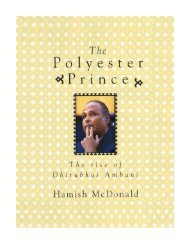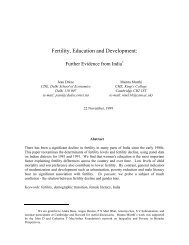You also want an ePaper? Increase the reach of your titles
YUMPU automatically turns print PDFs into web optimized ePapers that Google loves.
slow-down in trading and sometimes pandemonium when defaults were found. But<br />
brokers and traders need not settle even then, if they could afford the upfront<br />
margin payments and sometimes exorbitant interest rates on finance for a badla<br />
(carry-forward) deal.<br />
Using this prototype futures system, settlement could be deferred for months, often<br />
amplifying speculative runs in prices. On occasion, a script would pass through 50<br />
buy and sell transactions before being lodged for transfer of ownership. If the<br />
signature of the original seller did not pass muster, professional forgers operating in<br />
the side lanes of Dalal Street would guarantee an authentic-looking copy. It was an<br />
environment where research was just another word for insider trading, where the<br />
key knowledge was finding out which stocks were going to be ramped upwards or<br />
driven down by cartels of moneybag brokers and operators.<br />
Though it had thousands of listed companies and a nominal capitalisation similar to<br />
that of middle-sized stock markets like Hong Kong or Australia, the Indian<br />
sharemarket was not very liquid. Huge blocks of equity in the better companies were<br />
locked up by investment institutions or controlling families. Many of the smaller<br />
companies hardly traded at all. <strong>The</strong> floating equity in the major companies forming<br />
the market indices amounted to a few billion US dollars. Even in the 1990s, a<br />
concerted move with a relatively small amount of funds, upwards of US$50 million,<br />
could make the market jump or crash.<br />
Investors outside Bombay who could not hang around Dalal Street, browse the issue<br />
documents sold off barrows or pavements, or listen to the gossip while snacking on a<br />
bhel puri (potato-filled puff-bread) from a nearby stall, had to rely on a network of<br />
sub-brokers and agents reporting to the fully-fledged stockbrokers in the big towns.<br />
<strong>The</strong>y scanned a new crop of market tipsheets with names like Financial Wizard and<br />
Rupee Gains for news of their stocks. In some small towns, investors impatient with<br />
their remoteness took trading into their own hands: teachers, shopkeepers and other<br />
local professionals would gather after work in public halls to conduct their own<br />
trading, settling on the basis of prices in newspapers from the city.<br />
It was a situation made for a populist like Dhirubhai. His ebullience and punctilious<br />
nursing of relationships were transferred to a larger stage, using the mass<br />
communications techniques learned in marketing the Vimal brand name.<br />
‘<strong>The</strong> people of Reliance,’ began one typical promotion, on the cover of an annual<br />
report. ‘<strong>The</strong>rein lies our strength. In the skills of the scientists, the technologists; in<br />
the commitment of the engineers, the employees; in the dedication of the brokers<br />
the traders and above all, in the undisputed loyalty of the investors. <strong>The</strong>se are the<br />
people of Reliance. In their growth lies our growth; in their prosperity, our<br />
prosperity. For we are a family; we are all one. We are ... Reliance.’ In those years,<br />
Dhirubhai and Reliance had a success story to tell. On the technical side, the<br />
polyester plant at Patalganga was put up in a fast 18 months, and put into regular<br />
production in November 1982. Construction and the debugging of production lines<br />
had been supervised by Mukesh Ambani, who had been pulled out of Stanford<br />
University immediately on completing his master of business administration degree,<br />
and put in charge of the new project. Aged 24 at the outset, with a degree in<br />
chemical engineering, Mukesh Ambani won his spurs as an industrial manager at<br />
Patalganga.




